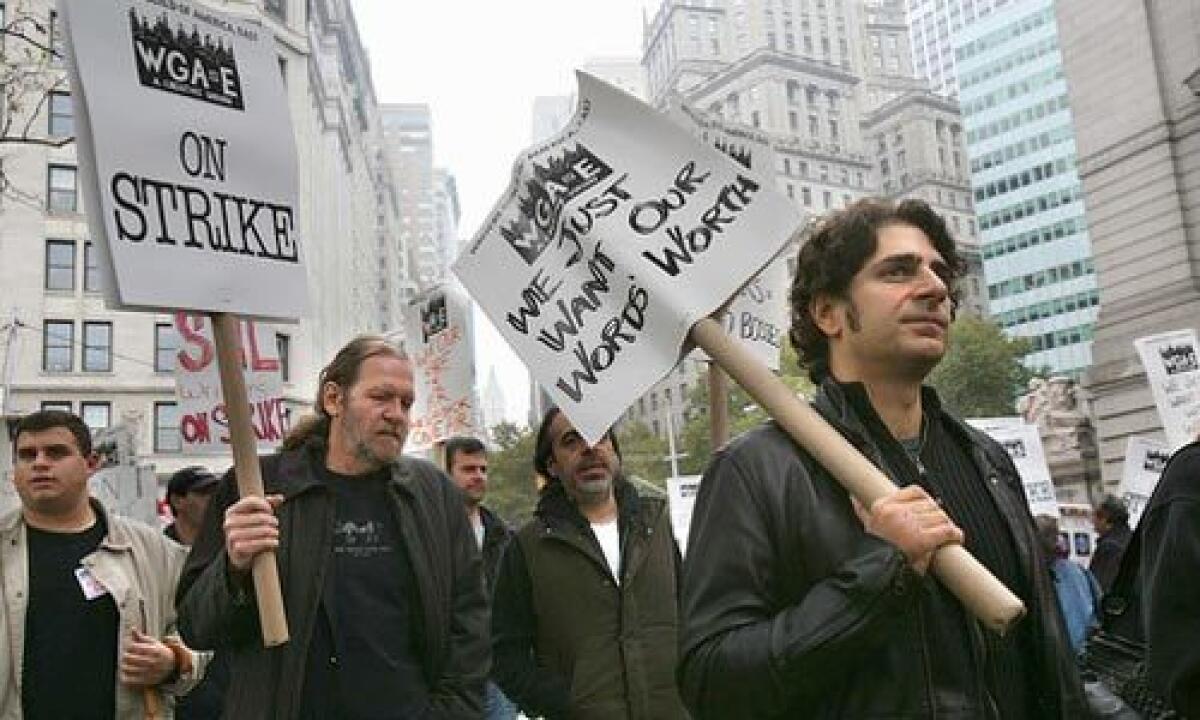Writers bring their drama to Wall Street

- Share via
NEW YORK — Striking TV and movie writers chose Wall Street as a symbolic backdrop Tuesday for their demand for a bigger slice of the new-media pie.
Their argument in a nutshell: Entertainment companies brag to the investment community that the Internet is a growing revenue source for them but then tell the writers that the future is uncertain and there isn’t enough money to share.
“We can’t BEAR studio BULL,” read one picket sign.
The Writers Guild of America, East set up picket lines on a gray morning at the edge of Battery Park, a subway stop away from Wall Street but as close as municipal officials would let them get to the New York Stock Exchange and the iconic bronze sculpture of a bull. About 11 a.m., there were 65 or so marchers, but the numbers rose as the day brightened.
Around lunchtime, some of the pickets walked closer to Wall Street to hand out leaflets in the financial district.
The WGA pointed to optimistic comments about the digital future from the heads of companies such as CBS Corp., Walt Disney Co. and News Corp. and projections from outside experts that, for example, video streaming revenue would hit $3 billion by 2010 and video downloading revenue would reach $1 billion a year later.
The Alliance of Motion Picture and Television Producers, speaking for the companies, noted that writers already were being compensated for new-media sales before the strike and that bigger offers were on the bargaining table when the union walked out Nov. 4, when a new contract could not be hammered out.
Besides, said alliance spokeswoman Barbara Brogliatti, the anticipated $1 billion a year for video downloading by 2011 still will be dwarfed by projected sales of as much as $20.7 billion worth of “old-fashioned” DVDs, so online nirvana isn’t dawning as fast as the writers contend. (Both sides cited estimates from PricewaterhouseCoopers.)
Given where digital media are headed, the strikers might also consider leafleting Madison Avenue because some experts believe that advertising-supported distribution methods such as streaming video will become an increasingly important source of income for big entertainment.
Under writers’ last contract, residual payments are triggered by the reuse of their creations: If a studio sells a TV series into syndication, or a movie to a pay-TV service like HBO, the writers get a cut. Likewise for the sale of a DVD or a video downloaded from iTunes or other such services. But writers don’t share in ad revenue, and they would like a bigger piece of future new-media sales.
Scott Jacobson, a writer for “The Daily Show With Jon Stewart,” one of the most popular shows on Viacom Inc.’s Comedy Central channel, said streaming video was a major issue for him and fellow writers.
Because “The Daily Show” plays satirically off the day’s headlines, its shelf life is too short for the DVD market, Jacobson said. Other than watching as it airs, the only way to see the show is over streaming video on its new Internet site, launched last month amid hoopla. The site is entirely ad-supported, Jacobson said, and “we don’t get a penny.”
News Corp. Chief Executive Rupert Murdoch, whose empire includes Fox TV and the 20th Century Fox studio, made a strong point about the future of ad-supported media Tuesday when he told an audience of shareholders that he intended to do away with subscription fees for online access to the Wall Street Journal after closing his purchase of the newspaper’s parent, Dow Jones & Co.
Making the website free would mean sacrificing $50 million in annual revenue, but he said it would expand the site’s audience to at least 10 million from about 1 million now.
Advertisers, Murdoch reckoned, would pay much more than $50 million for access to a crowd that size, particularly one with the Journal’s upscale demographics.
The Journal isn’t “The Simpsons,” but some experts say ad-supported streaming video to cellphones, computers and other devices may one day be the most lucrative way to recycle shows.
Among Tuesday’s Wall Street pickets were actor-writers Michael Imperioli (“The Sopranos”) and Tina Fey (“30 Rock”), playwright Tony Kushner (“Angels in America”) and screenwriter Tony Gilroy (“Michael Clayton,” the Jason Bourne series).
The strikers’ chants were sometimes drowned out by the racket of a jackhammer wielded by a street-repair crew a few paces from the picket line.
A giant inflatable pig, a prop on loan from the Laborers International Union, seemed a little worn out by several days on strike duty. As the writers marched, the pig sagged slightly against a nearby subway entrance.
RELATED STORIES Poll: Nearly 2 out of 3 Americans surveyed side with the writers. Page C7Upside: The longer the strike, the better for ABC news show “Nightline.” Page E1Rule: Members differ on complying with a guild policy on works in progress. Page E8
More to Read
From the Oscars to the Emmys.
Get the Envelope newsletter for exclusive awards season coverage, behind-the-scenes stories from the Envelope podcast and columnist Glenn Whipp’s must-read analysis.
You may occasionally receive promotional content from the Los Angeles Times.










